
Discover the captivating allure of Morocco, a North African country that enchants and delights travelers from all over the world. From its diverse terrain to its vibrant cities, this destination offers an abundance of unforgettable experiences.
Before you embark on your adventure, let’s debunk common misconceptions and provide answers to frequently asked questions about traveling in Morocco.
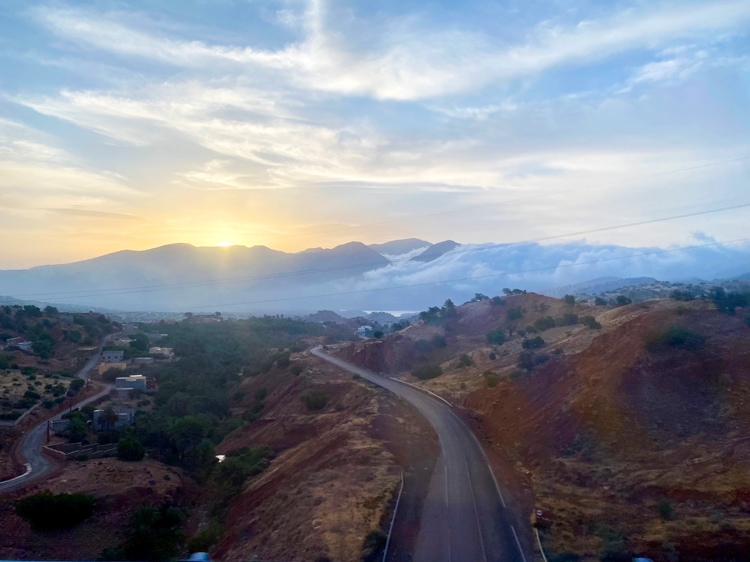
What Language is Spoken in Morocco?
There are a variety of languages spoken in Morocco including Berber, Arabic, and French. The official language is Arabic, but the language most widely spoken is a Moroccan dialect of Arabic known as Darjia. Arabic is a language with many varying dialects throughout North Africa and the Middle East.
Because Morocco was previously colonized by France, many people also speak French. Depending on the area, you might hear some Spanish as well. I recommend learning please and thank you for both Arabic and French before going. There are also many English speakers, but it’s important to bear in mind that not everyone may be proficient in the language.
Is Morocco Safe?
Generally speaking, Morocco is considered to be a safe country to visit. It is the most politically stable country in North Africa. It is also a country that is incredibly tourist friendly and the government has invested a lot in the infrastructure to draw more people. Of course, like many countries, it is always important to be conscientious of your surroundings and learn the safest way to navigate.
The most common crimes include petty theft, scams, and harassment. The best way to avoid petty theft is to keep an eye on your belongings and leave valuables at your hotel. Some parts of Morocco are very crowded, so keep a hand on your belongings, hide money in places where it would be less accessible, and be very aware of what is happening around you. Distraction is the main tool that pickpocketers use to steal. A money belt that is hidden under your clothes is never a bad idea.
The most common scam in Morocco is “faux guides” which are fake tour guides that lure you in with a good deal only to take you to shops where they earn a commission. Faux guides usually advertise themselves around tourist attractions.
Do your due diligence and research before booking a tour. The best way to avoid a faux guide is to book a reputable tour online or explore on your own. When it comes to ATMs, try to use ones located in hotels or banks. Scammers tend to linger near the more public ATMs.
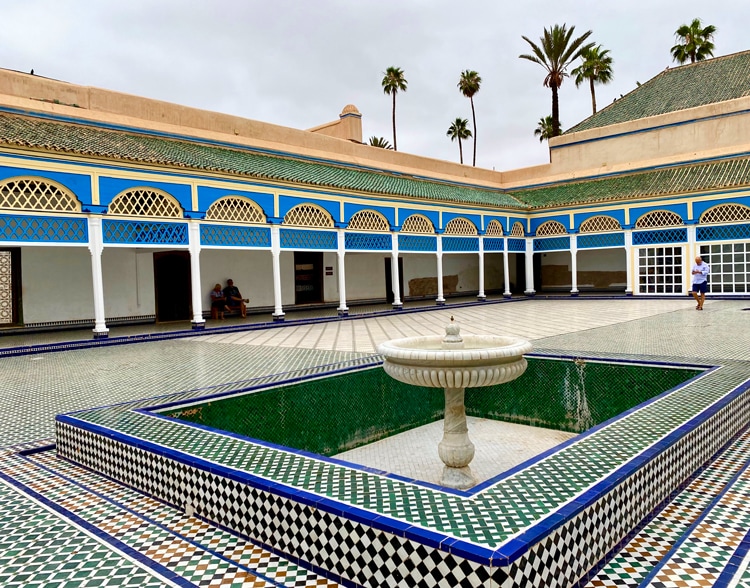
Navigating Safely
Taxis are generally the safest way to get around. Be sure to clarify the price before getting in. Sometimes they will rip you off if you don’t agree on a price ahead of time. ity buses are not considered safe for tourists, but my friends and I had success taking a cross-country bus from Agadir to Marrakech and back (5 hours both ways). Do your research before booking a ticket. City trains are considered safer than buses but always be wary of theft.
When walking, it is crucial to be highly aware of your surroundings. In Marrakech, it was hard to cross the street due to the crowds, many modes of transportation and the vague road rules. When walking in the souks, mopeds will buzz by with little consideration of pedestrians. Keep to the sides of the roads and paths and look around before crossing a street. It is also wise to avoid being on your phone in public so that you are not distracted.
When it comes to harassment, there are instances where people can get aggressive in souks or in crowded areas. The best words you could have at your disposal are “no, thank you.”
“No, thank you” in French & Arabic:
French: Non, merci
Arabic: La, shukran (لا، شكرا)
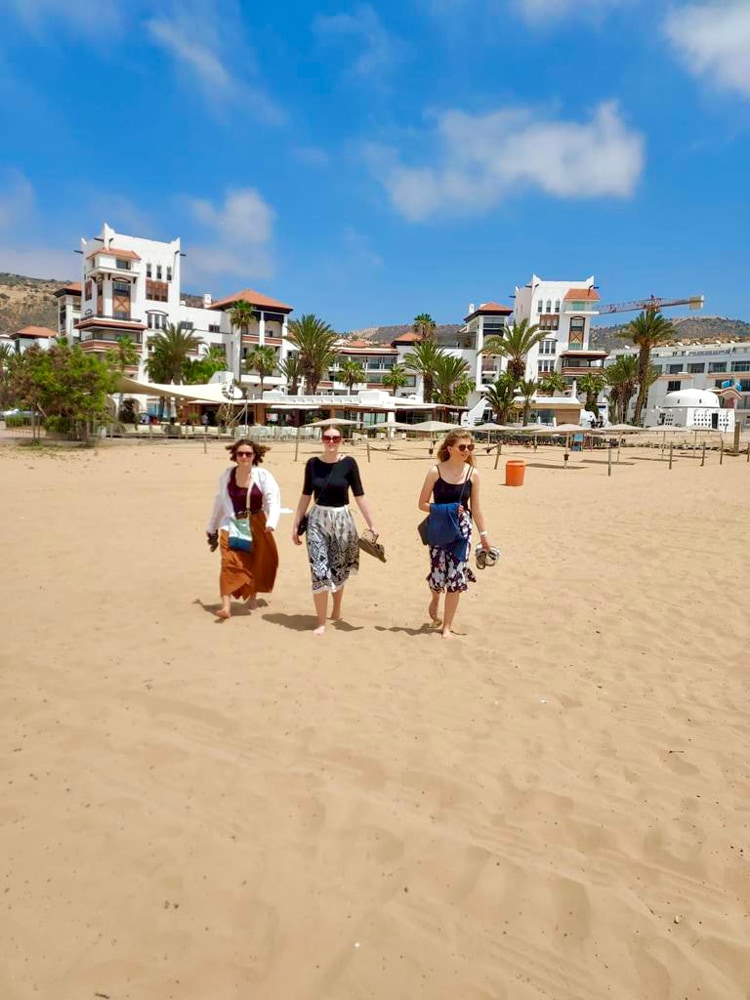
Is Morocco Safe for Women?
My friends and I were lucky enough to have our male friend along with us who not only spoke the language but was protective of us. Most people do not have the luxury of having someone like him accompanying their trip. In moments where we were not with him, we felt relatively safe with the exception of the occasional catcall or blatant stare. Of course, this can be an issue all over the world and I find it most drastic in travel throughout America. All things considered, I never felt unsafe. I did notice that the bulk of the people out and about were men, and there tend to be traditional gender roles when it comes to women staying at home.
In response to harassment or unwanted attention, it is best to ignore or pretend like you don’t understand. Interacting could escalate the situation so it’s always best to walk away.
This is very important for women specifically but does also apply to men. You have to dress conservatively for several reasons: out of respect for the Islam faith and culture, to avoid being pinned as a tourist, and to avoid even more harassment from men.
Cover at least shoulders and knees in public, and arms and legs when in areas of faith.
Although traveling alone here is possible, it is always safer to buddy up with fellow travelers. Avoid going out at night entirely. Male travelers don’t normally have issues walking around tourist areas at night, but it is not considered safe for female travelers.
Read More: First Person: The Moroccan Men’s Club
Is Morocco Safe for Families?
Yes, Morocco is safe for families. It’s always good to be cautious and to look after your kids, especially in super busy places like souks. There are plenty of other things to do with your kids like exploring cities, tours, swimming in pools or the ocean, or visiting museums. Souks can be very intense, so if you do choose to take children there, it’s important to keep a close eye on them so they don’t get overwhelmed or lost.
It is important for both you and your kids to be up to date on vaccines. Carry basic medications for dehydration, stomach discomfort, pain relief, etc. Make sure your kids don’t drink the tap water. There are also many stray cats and dogs roaming around Morocco. As cute as they are, make sure your kids don’t pet them because they could carry diseases. Lastly, book accommodations that are family-friendly for the best experience.
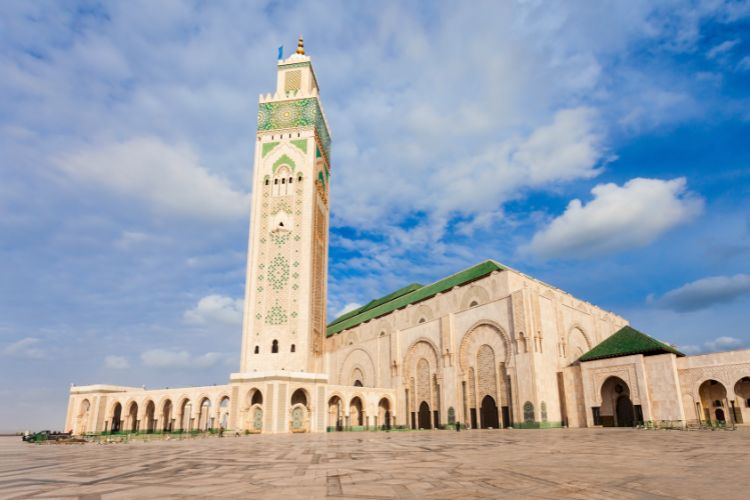
Islam, Mosques, and How to Be Respectful of the Faith
The majority of Moroccan citizens practice Islam. Morocco is not considered a theocracy so there aren’t terribly strict rules about religion universally enforced. There are plenty of people who practice their own variation of Islam and some who don’t practice at all. In most places, you will hear the call to prayer several times per day. This is usually broadcasted over a speaker from a nearby mosque and many citizens pause what they’re doing to pray.
How Should I Dress in Morocco?
As mentioned before, it is respectful to dress conservatively. For men, wear long-sleeved shirts and pants. For women, it is important to cover at least your shoulders and knees, and arms and legs when visiting mosques, shrines, or other religious sites. Many people bring scarves along to cover up further depending on the context.
Many religious buildings are closed off to non-Muslims so be aware of which ones ahead of time. When swimming, keep the bathing suits to the beach and the pool and be sure to cover up otherwise. Anything see-through or revealing in any way is not considered respectful. Because Moroccans are kindly hosting you in their country, it is advised to be as respectful as possible.
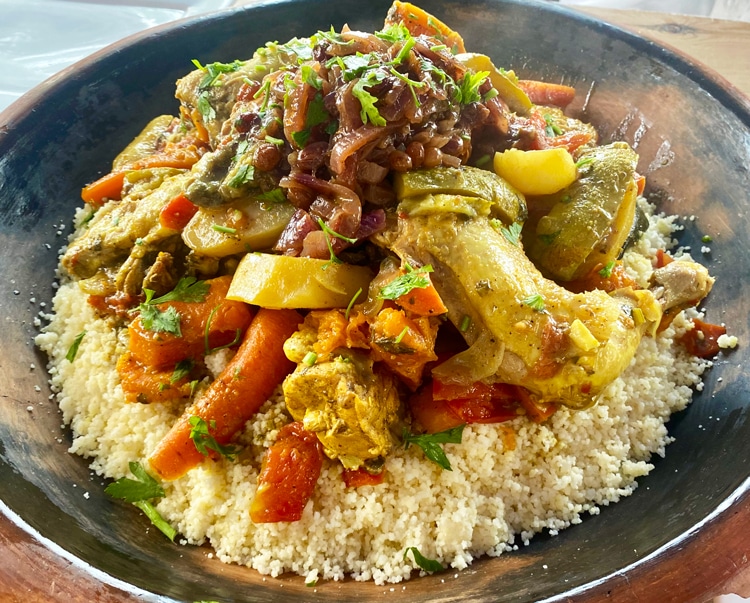
What Food is Common in Morocco?
Morocco has some incredibly flavorful rich food with diverse influences. You can find a variety of French food here such as pastries, crepes, baguettes, quiche, etc. There are also very traditional Moroccan dishes that include couscous, tajines, kefta, etc. The spiciness is mild to moderate but it’s always good to ask about it if you are sensitive. Of course, there are plenty of spices and herbs in most dishes which makes for such wonderful flavor.
There are opportunities to eat with your hands, which is the traditional way to eat in Morocco. Sometimes bread is used to scoop up food, and other times it is just your fingers. It’s customary to eat with your right hand, as cultural tradition dictates using the left hand for personal hygiene purposes. There is almost always an opportunity to wash your hands before eating as well.
For breakfast, there are plenty of options, including fresh fruit, meat, and cheeses. My personal favorite is a flaky pastry called rghaif which is often served with honey. Mint tea is served with breakfast, lunch, and dinner and I simply couldn’t get enough of it. It’s brewed and sweetened to perfection. There is also plenty of fresh juice and smoothie stands. Before heading into the souk, my friends and I got some fresh squeezed orange juice that came with a fancy straw.
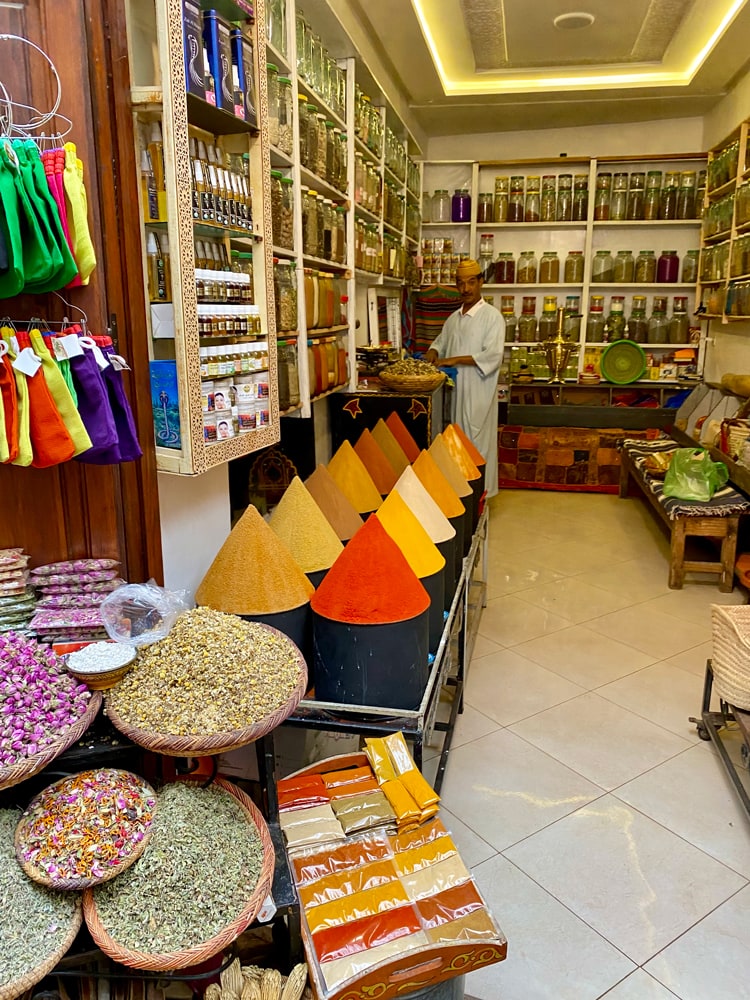
How Expensive is Morocco?
Compared to Europe and America, Morocco is considered inexpensive. Due to the current economic situation, many goods and services seem cheaper. This includes hotels, excursions, bus tickets, food, and souvenirs. When you’re in a souk, haggling is considered the norm so it is expected to negotiate for the price you want to pay.
There is a whole strategy to this that can take a while to master. When haggling, think of the max price you’re willing to pay and hold your ground, be polite and patient, and walk away if there is no agreement. A few friends of mine did end up paying far more than they could’ve because they were intimidated by the process. It’s always good to practice saying no and not feel pressured into buying anything you don’t want to.
What is the Moroccan Currency?
The currency is the Moroccan Dirham (MAD). Currently, the ratio is 1 USD to 9.81 MAD but be sure to check before visiting because it does change. It is wise to keep some MAD bills with you because many vendors only take cash (especially in souks). Credit cards work in many places but be sure that your international fees are not exorbitant before paying with your card.
Is Tipping Customary in Morocco?
Tipping is not mandatory but it is always appreciated to round up the bill if you’re happy with the service. You can tip tour guides, food service workers, spa workers, taxi drivers, hotel staff, etc. It does not have to be 20% of the bill like it is expected in America.
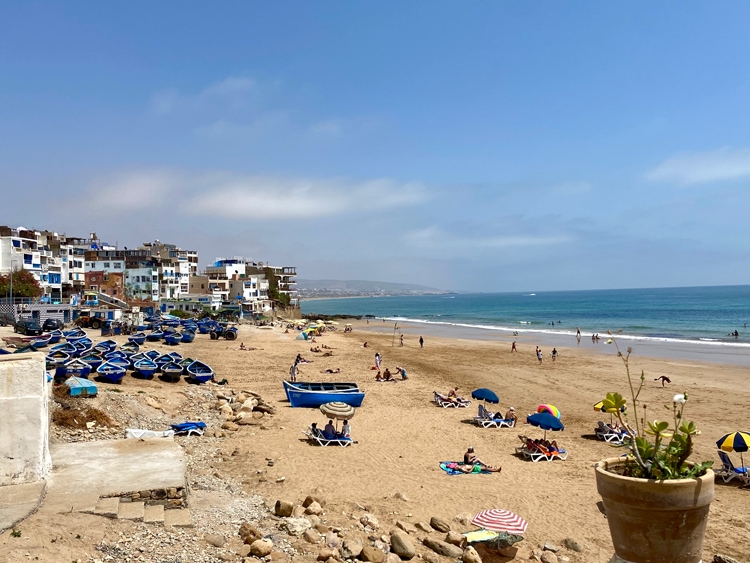
When is the Best time to Travel to Morocco?
This is highly dependent on where you want to go and what you’re looking to do. Morocco has a diverse climate with mountainous regions, beaches, and deserts. My friends and I went in late May, and we had fantastic weather. We were mostly in the coastal town of Agadir which stayed a comfortable 70 degrees most days.
Spring (March to May)
Spring is the ideal time to visit most of the country, which is right when the mountain and coastal terrain gets green and lush. The weather is mild and the temperatures are comfortable both in the cities and the mountains.
Summer (June to August)
Summer in Morocco is typically very hot, especially in the desert regions. It might be more tolerable in coastal areas or in the Atlas Mountains. The advantage of traveling to Morocco in the summer is the potentially lower rates. If you can tolerate heat and low prices are important to you, Summer might be a good choice.
Autumn (September to November)
Autumn is another great time to visit, for similar reasons as Spring. The summer heat by this point has subsided and the temperatures are moderate and great for most activities.
Winter (December to February)
Winter is a nice time to explore the Sahara desert for it is a tolerable temperature during the day. It can definitely get cooler at night. Coastal areas are comfortable as well. The mountains in the winter are generally cold and snowy.
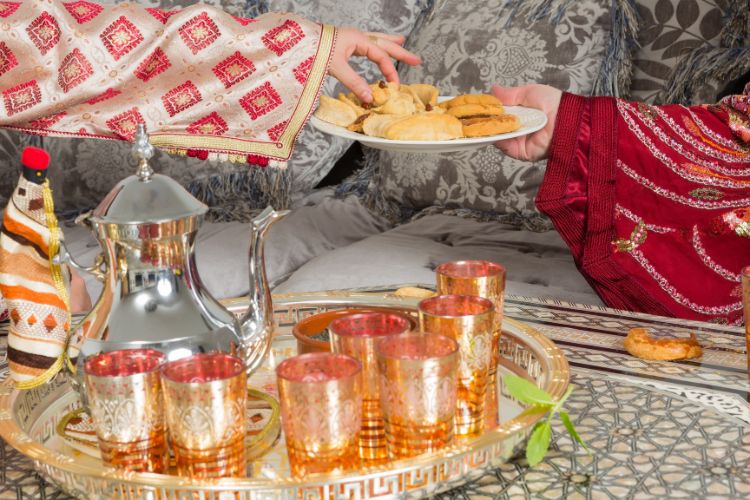
Ramadan
It is important to keep in mind that there are various Islamic holidays scattered around the year that could have an effect on your experience. Ramadan, the biggest holiday, is a sacred month in Islam that falls on the ninth month of the Islamic lunar calendar. This tends to align with the spring months but changes every year. During this time, the significance of Muslims fasting from sunrise to sunset should be acknowledged as it can potentially impact your travel arrangements.
Many restaurants are not going to be open during normal hours so you could cook your own food or get food ahead of time. Be respectful and refrain from eating, drinking, and smoking in public during the day. Aside from restaurants, many other establishments will have altered hours so be sure to check the hours in advance.
It is not respectful to visit mosques during prayers, and this is especially important during Ramadan. You can visit some mosques when there are no events or prayers happening. A really special reason to travel to Morocco during Ramadan is the Rue de la Fouta, which are Ramadan night markets. They are lively and vibrant and offer a variety of traditional food and goods.
How Do You Get to Morocco?
There are a variety of ways to get to Morocco. My friends and I were studying abroad in France when we visited so we were able to find a relatively inexpensive flight to Agadir out of Marseille, France. Coming from the States, this can be a little more expensive. My budget-friendly advice is to hit a few countries in one go because traveling in Europe and North Africa is much easier and cheaper once you’re already there. Getting to Europe of course is expensive from America, but there are definitely some great deals that pop up every now and then.
The main international airports in Morocco are the Casablanca Mohammed V International Airport (CMN), Marrakesh Menara Aiport (RAK), and Agadir Al Massira Airport (AGA). From Europe, you could also take a ferry from one of the ports in Spain to one of the two ports in Morocco (Tangier and Ceuta).
Once you’re in the country, you can take buses to travel from city to city. The public Moroccan bus system is called CTM and are a great and easy way to tour the country without needing to rent a car.
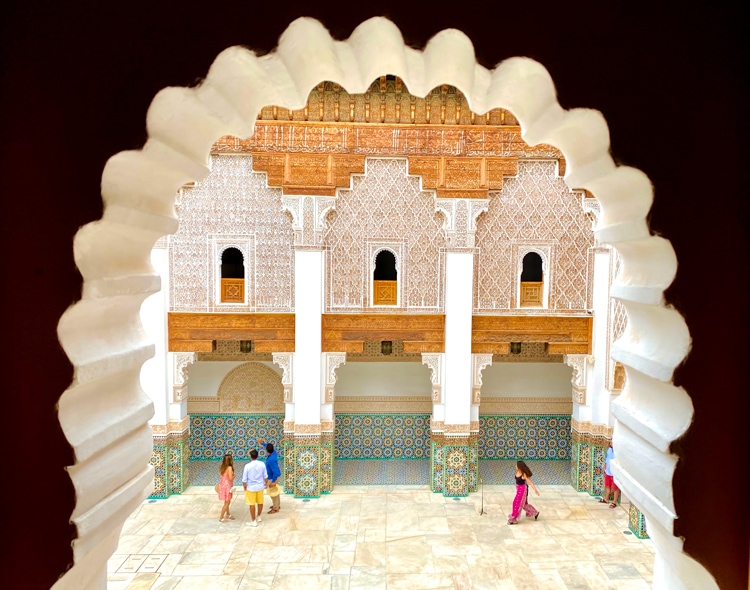
Where Should I Visit in Morocco?
The most well-known is Marrakech which is big and central with plenty of traditional elements to explore. There you will find some of the biggest souks and dozens of Mosques, palaces, shops, and restaurants. Fes is another great city with a historic medina and cultural heritage. Casablanca is Morocco’s biggest city and is a major commercial hub. This city is a unique cultural melting pot with a huge Spanish influence. Agadir is another amazing city to visit. It sits on the west coast and has more modernized infrastructure and great surfing.
Read More: Adventures in Agadir: Exploring Morocco’s Enchanting Coastal City
Where Should I Exercise Caution?
Tourists can have a great time in both Tangier and Chefchaouen (The Blue City), but there are high reports of scams and aggressive solicitors so it is important to be cautious. Some rural areas are nice to see but can carry more of a risk. It is advised to go with a tour guide and avoid border areas. Morocco’s bordering countries, Western Sahara, Algeria, and Mauritania are not considered safe due to political volatility and security concerns.
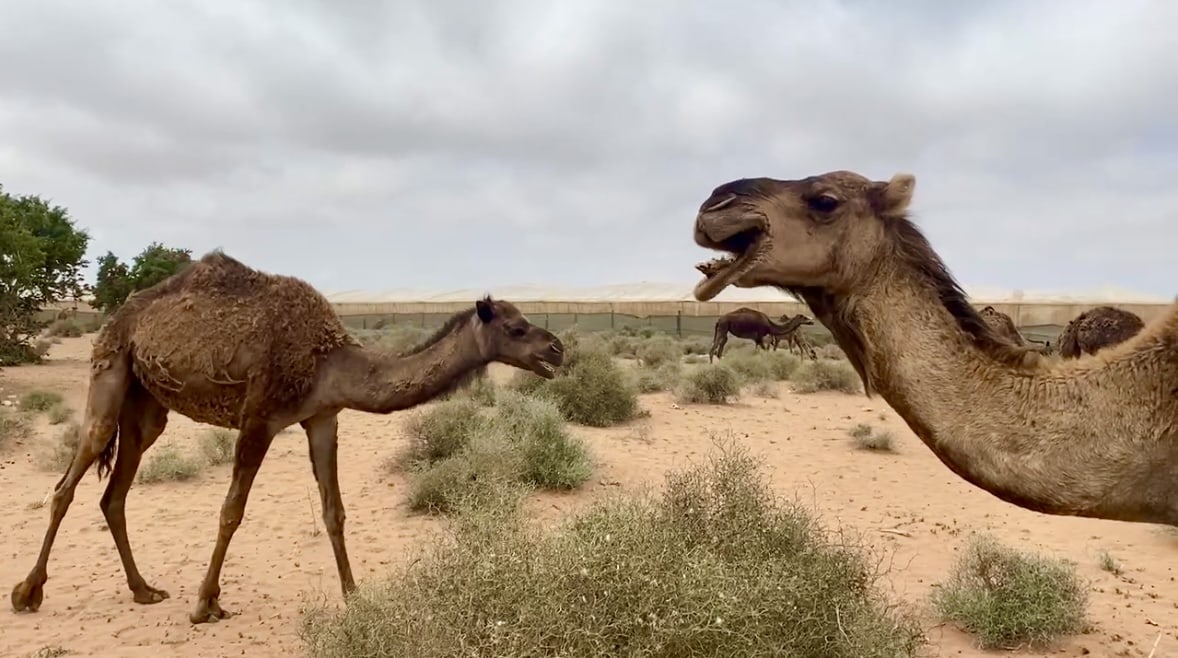
Are Camels Comfortable?
This is highly individual, but they are not the most comfortable. Because they are so tall, they tend to teeter side to side and sometimes it feels like you’re going to fall off. The saddles account for the humps but they’re still not exactly padded or comfortable. I thought that riding a camel was a hoot and if you have an interest, I say its absolutely worth the temporary discomfort.
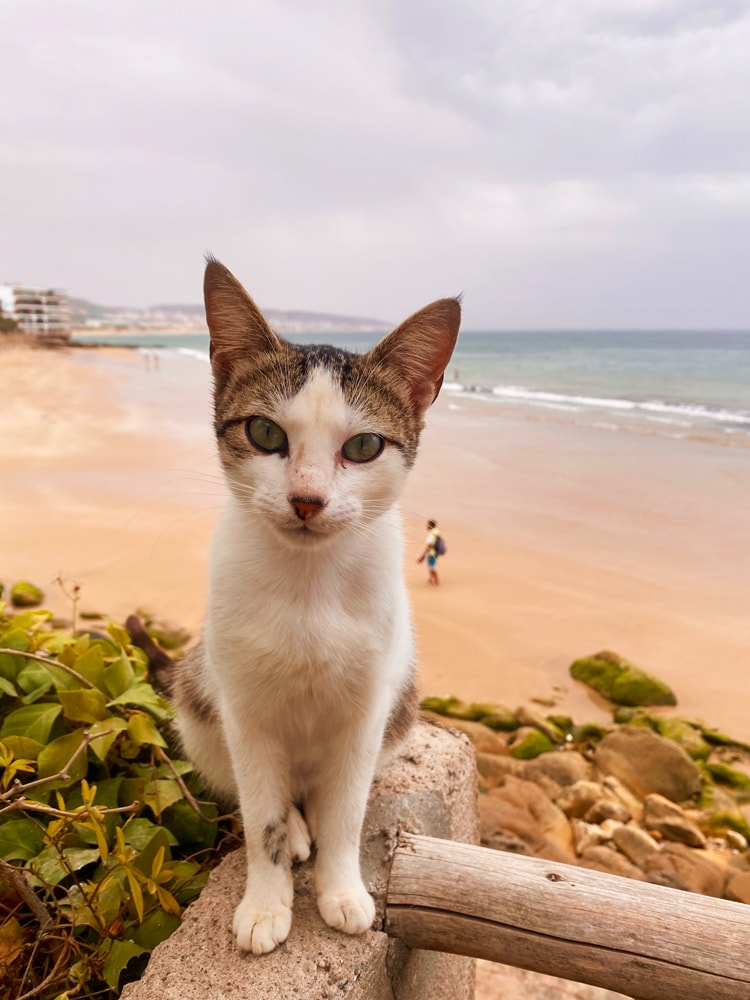
Good to Know & Additional Travel Tips
- Ask before taking pictures of people or their property. When I was there, I took a picture of a camel and was scolded (in Darjia). This can happen everywhere and they typically demand money in exchange for the photo.
- Buy bottled water or use a water bottle with a filter. Avoid getting ice when out at restaurants. This is because Moroccan tap water has a much higher mineral content than other nations so tourists have a hard time coping. This can sometimes result in a temporary stomach illness, but nothing too serious.
- Avoid getting a rental car unless you are a confident and experienced driver. Driving in Morocco is dangerous due to poorly maintained roads, traffic, and very aggressive drivers. Even riding in a taxi can feel like an amusement park ride.
- When eating out, try to find clean restaurants packed with locals. The food at clean establishments will likely not be contaminated and it’s always a good sign when locals eat there.
- Warning for the LGBTQ+ Community: There are no LGBTQ+ rights in Morocco which can make it dangerous for those part of this community. It is illegal to be in same-sex relationships and is punishable by fine or imprisonment. Unfortunately, it isn’t recommended to visit with your partner unless you’re able to keep your relationship well hidden. Hopefully, this will change as the world progresses.
- COVID-19: Of course, this is and will continue to be an issue in today’s world. When I went in May of 2022, we did have to fill out some paperwork and have proof of vaccination. Shortly, after, this was no longer needed to enter. They still advise exercising appropriate caution like washing hands, wearing masks in crowded areas or if feeling sick, etc. Learn more about COVID-19 in Morocco here.
Read More About Morocco
- Guide to Experiencing Mt. Etna on a Budget, the Biggest Active Volcano in Europe - July 25, 2024
- The Magical Town of Portovenere, the Perfect Retreat Near Cinque Terre - June 28, 2024
- Best Places to Spend the Fourth of July in the USA - June 16, 2024

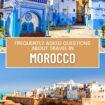
Thanks for your article. I am planning a trip to Morocco in April and the information you provided will be very useful. It will be my first time in Africa and I am really looking forward to the experience. Thanks again for your advice.